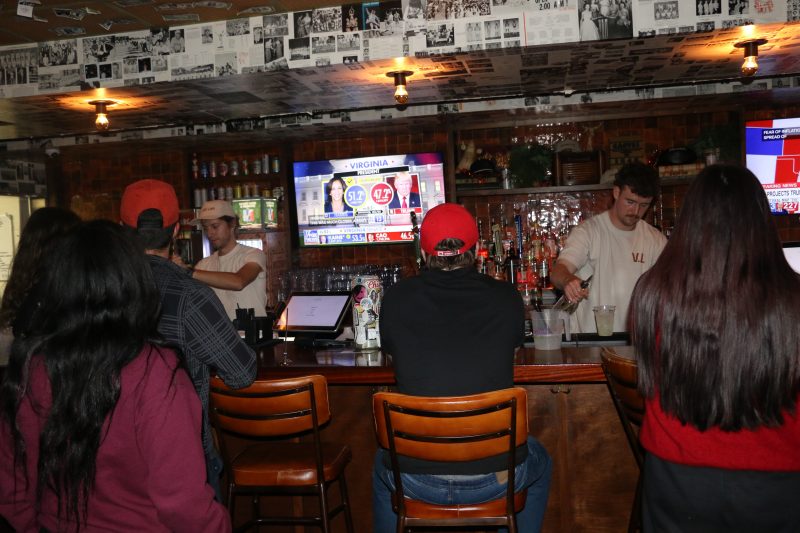Gen Z Voters at UT Election Party Say They’re Concerned About Economy, Immigration, Gaza
By Jasmine Wright
Reporting Texas

Campus-area voters watch election returns at Victory Lap on Nov. 5, 2024. Jasmine Wright/Reporting Texas
As the election results came in Tuesday night, University of Texas students swapped stories at a West Campus bar of finding polling locations, of voting for the first time and of the decisions that drove their choice for president.
“Voting for president is a big decision,” Mauro, a UT economics senior said during an election night watch party at Victory Lap, an off-campus bar next to the University of Texas.
According to the Center for Information and Research on Civil Learning and Engagement, nearly 40 million people between 18 and 27, otherwise known as Gen Z, were eligible to vote in the election, making it a newly politically active group that could affect the country’s political future.
“If young people don’t vote, then their issues don’t get heard,” said Brandon Rottinghaus, a political science professor at the University of Houston. “Young voters are anxious to see a candidate that inspires them and will implement the changes they would like to see.”
A report from the Center for the Future of Democracy at the University of Cambridge found young people’s faith in democratic politics is lower worldwide than any other generation. According to the study, young people’s dissatisfaction with the political process is a global trend that raises the stakes during presidential election cycles.
“Gen Z votes in bigger numbers during presidential years when there is more tension on who is president and how they can impact the flow of policy,” Rottinghaus said.
Beneath strands of twinkling lights, nearly 100 spectators sat at the Victory Lap picnic tables or stood in line for the bar while watching the results trickle in. Those attending the watch party identified themselves as juniors and seniors at UT, alumni, Austinites and foreign-exchange students.
“I voted for Donald Trump primarily because of his policies on the economy and immigration, particularly job outsourcing and security,” said Skyler, an Austin resident who didn’t want to provide his last name.
According to a poll from Texas Politics Project, 22% of 18- to 29-year-olds believed the economy was the most important issue during this election cycle. Trump’s calls for expanding energy drilling projects and reducing taxes were attractive to young voters concerned about the economy, Rottinghaus said.
”I encouraged people around me to vote,” said a Trump voter named Kelsey who said she thought he would cut taxes and lower inflation and that they share the same Christian values. It’s your civic duty and your voice should be heard.”
After Harris became the Democratic nominee for president, young voters across the nation re-engaged with the election with a more energetic outlook, Rottinghaus said.
“This election was more about being anti-Trump, abortion rights, women’s rights and human rights,” said Ruchi, a student who did not want to give their last name and voted for Harris.
“I have family here in the U.S. and I think Kamala Harris is the most qualified leader for the U.S. Her policies are better.” said Inez, a UT international exchange student that was not eligible to vote.
A survey conducted by The Youth Vote found 18% of young people planned not to vote at all.
“For me, genocide is a red line. If both sides are supporting genocide, then this isn’t a democracy,” said Sky MacAdams, a UT alumni, community activist and candidate for Austin school board.
“The system is inherently broken. The rich and power dominate politics. I would have voted if I believed either candidate had genuine intentions for the American people, but I don’t like pandering to people to gain votes and blaming the other side for all the problems,” said Mauro, a student who did want to give his last name.
According to exit polling, Trump reached demographics that have historically aligned with the Democratic Party, especially Black and Latino men and during this election 31% of Trump’s voters identified as non-white.
“We are seeing small divides where young Black men and latinos are willing to elect Republican candidates,” said Rottingaus. Seeing as major groups avoided participating and aiding a win for Harris, Democratic strategists are analyzing and reflecting this trend and how to recover from the loss.